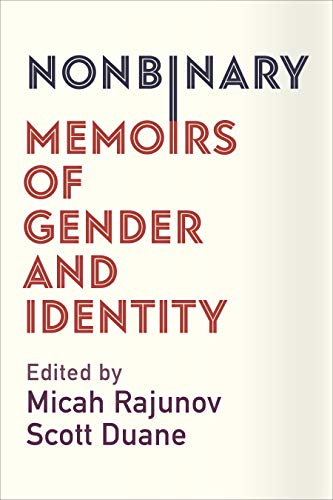I found myself talking about all-girls code clubs in an NCompass Live presentation earlier this week. Mid-sentence, I remembered an episode of the Queer Eye where a trans girl was trying to find groups in school that fit her identity. As I recalled her troubled face, I ended the sentence to include people who identify as girls. I tried to limit the verbal word vomit as I struggled to find the right words to describe people who don’t identify as male or female.
That night, I went on Hoopla and checked out the audiobook for Nonbinary: Memoirs of Gender and Identity by Micah Rajunov, hoping to find the right words. Plus, it’s almost Pride Month, so it might be a good book to help people understand a changing world. The nonbinary narratives in this book give a voice to those who do not fit neatly into the gender categories of male or female. As with any large group of people, one collection of stories can never represent an entire subset of the population. Each individual defines themselves.
Honestly, I find it difficult to neatly define what nonbinary means when the nonbinary population is still trying to define themselves, and struggling for acceptance in the world. Before reading this book, I knew that some nonbinary people used the they/them pronoun instead of she/he. Several years ago, I met them in a writing group and heard their story. Yes, you read that sentence right.
To this day, I still hear my grammar school teacher saying on repeat: ‘They’ are a group of people. She is an individual. He is an individual. We had to practice proper pronoun use around the room. Now, I still have to override the grammar side of my brain to be inclusive to all genders. So, I met them in a writing group. Just one person out of many people I met in that group.
I heard their story in that group, and now I have read the memoirs in this book. I learned from a man who finally gained the courage to transition to a female after fifty years. A trans advocate revealed the struggle of the trans nation. I added new words to my vocabulary: femme, gender rebel, genderqueer, nonbinary. These words are not my own, so I can’t help but pronounce them as though practicing a foreign language. The words are not wrong, just new. My voice tilts up at the end, as though asking if I got it right. Femme? Genderqueer? They’re never there to answer. This book gave them a voice and helped me find better words.
Stories are how we come to understand ourselves and the world. Sometimes we find a piece of ourselves we never knew was missing. New ideas give deep-seated, intangible feelings a name. Naming an enemy gives us power to stand strong in the face of adversity. Like Rumplestiltskin. I read and wondered how many people saw ‘nonbinary’ and found peace after decades of mental anguish. Personally, I would prefer them to be nonbinary rather than depressed or suicidal.
So next time I talk about a Girls Who Code club, I will say that they are welcome. Anyone who wants them to feel safe and included is welcome. Anyone who wants to degrade them and make them feel insecure, unsafe, and less than human can see themselves out. Maybe not forever, just long enough to process. We are all human. Read their story, then we can all learn together.
Rajunov, Micah, and Scott Duane, editors. Nonbinary: Memoirs of Gender and Identity. Columbia University Press, 2019.


